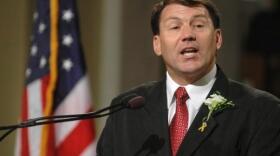Candidates in two high-profile South Dakota elections are meeting this summer to debate issues important to voters. Friday the South Dakota Farmers Union hosted the most recent discussions among candidates for governor and US Senate. Both debates generated ideas about energy in South Dakota.
A member of the debate audience at the State Fair in Huron wants to know whether U-S Senate candidates support building the Keystone XL pipeline. The proposed route runs through western South Dakota, and the pipe would carry crude oil from Canada to Texas refineries.
Democrat Rick Weiland says he opposes Keystone XL. He says the pipeline doesn’t promote energy security or environmental safety.
"The other thing I learned when I was at FEMA is that levies break, pipelines leak. That Keystone one that’s been built? It’s got 98 miles of joints that were welded in a bad, bad way, and they’re having to dig it up and do it all over again. And if this oil sludge that comes in from Canada, which is heated up to 200-some degrees, leaks, it’s heavy oil. It’s going to go into our water, and it’s going to create some really ugly problems for our state and for our country," Weiland says.
Weiland says Keystone XL creates mostly temporary jobs, so it doesn’t help South Dakota create long-term employment.
Independent candidate Gordon Howie says he supports the Keystone XL pipeline. He says it’s a big issue that the federal government has the authority to determine South Dakota’s energy policy.
Republican Mike Rounds also speaks of big government in control. He says the federal government wants to prevent the Keystone XL pipeline because bureaucrats want to keep Americans from energy independence. He says train cars full of oil prevent South Dakota crop growers from shipping grain.

"We ought to take that oil up there, and we ought to put it in a pipeline and ship it out. We do need the rail cars. Part of the problem is they’ve got all that oil literally glutting the rail lines. What used to take two weeks to get our stuff to market is now taking three weeks. It means we need 50 percent more cars for an average one, let alone this year in which we are going to have a marvelous harvest," Rounds says. "So we agree – common sense says get the oil, put it into a pipeline – safer way to deliver it. And we need to become energy independent in North America."
After Rounds, Independent Larry Pressler says an oil pipeline IS safer for the environment than shipping crude on trucks or trains. But Pressler says he wants to work with President Barack Obama to get South Dakota a better deal.
"What we really need is a domestic pipeline in North Dakota to move the Bakken oil east to Chicago to various refineries along the way. That would relieve the pressure on our grain shippers, but the XL pipeline doesn’t do anything to get more rail cars and more big engines, and that is what is really needed," Pressler says.
Pressler, Rounds, and Weiland say the state should also embrace ethanol production, but Pressler says South Dakota should explore other sources for the fuel.
The independent candidate for governor of South Dakota agrees – but he has a specific crop in mind. Mike Myers says the state should legalize industrial hemp.
"One out of every three rows of corn goes into ethanol. Hemp doesn’t need fertilizer. Hemp is absolutely where we have to go. Canada knows that," Myers says. "And I would ask Governor Daugaard and Representative Wismer whether or not they will support me and join me in promoting the legalization and endorsement of a source of ethanol that has got a good market."
Myers’ fellow gubernatorial hopefuls stick to the more traditional South Dakota ethanol source: corn. Democrat Susan Wismer says ethanol brings an exceptional market to South Dakota farmers.

"But we could use some leadership from the administration in dispelling two myths: number one, that it’s illegal to put E-30 in standard vehicles and, number two, that E-30 will damage engines. There has not been a single warranty denial based on E-30 usage," Wismer says.
Wismer says she applauds the transition of many state vehicles to running on a higher ethanol blend, but she wants the entire state fleet operating on E-30. She says she’ll make that happen as governor and encourages the current governor to do it now.
Incumbent Republican Dennis Daugaard says ethanol industry growth benefits the whole state. He says he continues to support ethanol production in South Dakota.
"I ordered that all of our larger fuel pumps in our larger facilities provide ethanol at the E-15 level. And I’ve written letters to the EPA supporting the ethanol industry to encourage higher blends," Daugaard says. "I recognize the blend wall that exists at the E-10 level, and I’d like to see us break through that blend wall. I’ve also authorized and funded dollars for incentives for fuel station owners to install blender pumps."
Daugaard says ethanol production diversifies farm income and adds value to the crops farmers grow.
Among other topics, questions at the two debates also included balancing the budget, road repair, economic development, and education.
This story originally aired on SDPB Radio on Tuesday, September 2, 2014.





